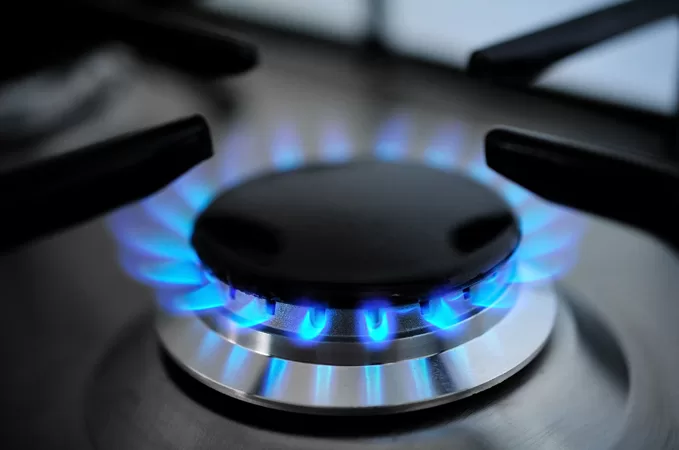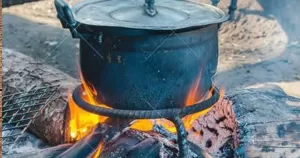Amid the economic challenges in Nigeria, the soaring price of cooking gas, which has skyrocketed to ₦1,500 per kilogram from ₦900 earlier this year, has driven many households back to traditional cooking methods, such as using charcoal or firewood. While it may seem financially prudent to switch back to these older, less efficient fuels, the long-term consequences on health, the environment, and overall quality of life make a compelling case for sticking with cooking gas.
The Current State of Cooking Gas Prices
The price of liquefied petroleum gas (LPG) in Nigeria has seen a staggering increase, with data from the National Bureau of Statistics (NBS) indicating a 65.66% rise over the past year. As families grapple with these escalating costs, many are turning to alternatives like charcoal or firewood, which may appear more affordable. For example, a bag of charcoal can be purchased for around ₦9,000 and last for over two months, whereas a 6kg cylinder of cooking gas costing the same ₦9,000 only lasts about three weeks.
While the short-term financial relief from using firewood or charcoal may seem appealing, the hidden costs of such choices can outweigh these benefits.
Health Risks of Traditional Fuels: Charcoal, and Firewood
One of the most pressing concerns regarding the use of firewood and charcoal is their severe impact on health. According to the World Health Organization (WHO), approximately 94% of people in Nigeria use traditional fuels for cooking, leading to alarming rates of indoor air pollution. This pollution is a significant health risk, responsible for the deaths of up to 64,000 people annually in Nigeria, making it a leading cause of mortality after malaria and HIV/AIDS.
Air Pollution
Smoke from burning firewood contains harmful particulate matter, carbon monoxide, and other toxic substances that can lead to respiratory diseases, cardiovascular problems, and even cancer. The WHO classifies air pollution from these traditional cooking methods as a major public health issue. Chronic exposure to smoke can result in long-term health complications, particularly for vulnerable populations, such as children and women who spend the most time near cooking fires.
Child Health and Development
Children are especially susceptible to the dangers of indoor air pollution. Exposure to smoke can lead to respiratory infections and developmental issues. Furthermore, studies have shown that children raised in households that use traditional fuels are more likely to suffer from stunted growth due to the cumulative health impacts of malnutrition and disease
Deforestation and Climate Change
Switching back to firewood also raises significant environmental concerns. The use of firewood contributes to deforestation and habitat destruction, leading to biodiversity loss. Over-reliance on wood as a fuel source strains local forests, threatening the balance of ecosystems.
Deforestation not only diminishes local flora and fauna but also exacerbates climate change. Trees play a critical role in carbon sequestration, helping to absorb carbon dioxide from the atmosphere. The more trees that are cut down for fuel, the less effective these ecosystems are at combating climate change.
READ ALSO: Natural Gas: The Viable Alternative to Fuel Amid Fuel Hike
Health Benefits of Using Cooking Gas
Cooking gas, on the other hand, is a cleaner energy source that does not contribute to forest degradation or habitat destruction. LPG is classified as clean energy by the WHO, producing fewer emissions and requiring no wood or charcoal to be burned. By using cooking gas, households can help mitigate their impact on the environment and contribute to a more sustainable energy future.
Cleaner Burning
Cooking gas is known for burning cleanly. Unlike firewood and charcoal, which produce harmful smoke and pollutants, LPG emits very few harmful substances. The World Health Organization (WHO) points out that using traditional fuels can lead to indoor air pollution, which poses serious health risks. By using cooking gas, families can significantly reduce their exposure to these harmful emissions.
Reduced Risk of Respiratory Diseases
The smoke from burning wood contains toxic substances that can cause respiratory problems. Regular exposure to these pollutants increases the risk of illnesses like asthma and pneumonia, especially in vulnerable groups such as children and the elderly. Sticking with cooking gas lowers these health risks and creates a safer environment for everyone in the household.
Better Quality of Life
Using cooking gas not only protects physical health but also improves overall living conditions. Without the smoke from traditional fuels, indoor air quality is much better, creating a more pleasant cooking and living environment. Families can enjoy cleaner air, which helps reduce headaches, fatigue, and other health issues often associated with poor air quality.
Sustainable Energy Source
Using cooking gas is more environmentally friendly compared to firewood. The use of firewood contributes to deforestation and habitat loss. In contrast, LPG is a cleaner fossil fuel that has a lower impact on local ecosystems, making it a better choice for the environment.
Lower Carbon Emissions
Cooking gas burns more efficiently than traditional fuels, resulting in fewer carbon emissions. By reducing reliance on wood and charcoal, households can help combat climate change. Choosing cooking gas is a step toward more sustainable living, which is crucial in today’s world.
Cost Efficiency
While cooking gas may seem more expensive initially, it is essential to consider long-term savings. LPG burns hotter and lasts longer than wood or charcoal, which means families spend less money on fuel over time. Moreover, the health costs linked to using traditional fuels can far exceed any initial savings, as families may face higher medical expenses due to health issues caused by indoor air pollution.
Time-Saving
Cooking gas allows for quicker meal preparation due to its consistent heat. Families can save time in the kitchen, allowing for more time spent on other important activities. Gas stoves provide precise temperature control and instant heat, making cooking more efficient and enjoyable.
Reduced Fire Hazards
Cooking with firewood or charcoal comes with inherent safety risks, including the potential for uncontrolled fires. Open flames can easily lead to accidents, especially in homes with children. While cooking gas also has risks, it is generally safer when used properly. Gas stoves are designed with safety features, such as flame failure devices and automatic shut-offs, making them a safer option.
Lower Risk of Burns
Using wood or charcoal increases the chances of burns, particularly in homes with children. The exposure to open flames raises the risk of accidents. Cooking gas provides a more controlled cooking environment, which minimizes these hazards and helps keep families safer.
Easy Access
Cooking gas is becoming increasingly available in Nigeria, with many gas stations and distributors across the country. Although prices may fluctuate, the infrastructure for cooking gas is expanding, making it a convenient choice for more households.
Simple Storage and Use
Gas cylinders take up less space and are easier to store than large quantities of firewood or charcoal. They require less maintenance, making them a practical option for families. Additionally, gas stoves are easier to clean, streamlining the cooking process.
Conclusion
In the face of rising cooking gas prices, the temptation to revert to traditional fuels like firewood or charcoal is understandable. However, the benefits of sticking with cooking gas far outweigh the short-term financial relief offered by alternatives. From significant health risks and environmental degradation to economic considerations, the case for LPG is compelling.
Investing in cooking gas is not just a matter of convenience; it is an investment in health, environmental sustainability, and long-term economic savings. As Nigeria continues to evolve, embracing cleaner energy sources like cooking gas is essential for building a healthier, more sustainable future for all.


